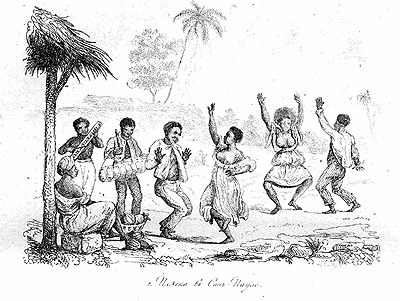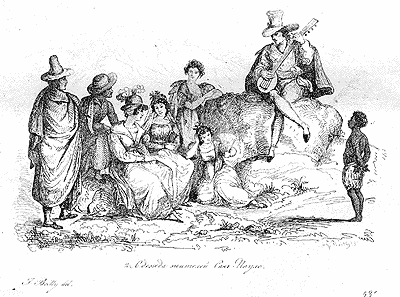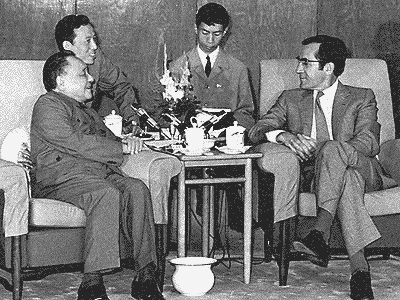For over five centuries, empire was the collective way of life
and the essential part of the mentality of Portugal. Since the
seizure in 1415 of Mohammedan Ceuta, a town on Morocco’s
Mediterranean coast, and until the liberation of its African
colonies after the 1974 Carnation Revolution, Portugal, a strip of
land in the westernmost part of Europe washed by the Atlantic
Ocean, was proud to be ranked as a world power. Empire left a deep
imprint on the nation’s consciousness and formed its contemporary
outlook in many ways.
Every world power has a unique destiny, yet the Portuguese
lessons may be relevant for other peoples who were also destined to
live through a post-imperialist transformation.
EMPIRE AS A CONSEQUENCE OF WEAKNESS
The motives that prompted Lisbon to opt for the imperial path
differed greatly from the colonialist ideology espoused in London
or Paris.
In August 1385, during the Battle of Aljubarotta, the Portuguese
showed that they rejected the idea of being integrated in Castile
and fought instead for their independence. That decision led to the
necessity of finding answers to two extremely difficult questions:
First, Portugal had to overcome its economic weakness and, second,
oppose the Castilians’ aggressive unification ambitions around the
Pyrenees.
Attempts to solve the first problem predetermined the
willingness to create an empire. Portugal rushed together an army
of 19,000 soldiers, 1,700 sailors and 200 ships and seized Ceuta
from Arab control. Given Portugal’s limited demographic resources
and financial reserves, this testified to how serious its plans
were. The crusading zeal, explained by efforts to disseminate the
teachings of Jesus Christ, were only a guise for the true goals
that Lisbon sought to achieve in the course of conquests. This
explains why the common people, not to mention the clerics and
knights, supported the first imperial undertaking.
For 500 years, Portugal enjoyed a general consensus from its
people concerning its colonial possessions; the government never
had problems finding human resources for its overseas territories,
both from among the rank-and-file resettlers and aristocratic
administrators.
The outcome of the Ceuta campaign of 1415 failed to live up to
Lisbon’s hopes for economic growth, but it paved the way to solving
the second problem. The Portuguese responded to Castile’s ambitious
plans by pushing for expansion into the ocean and making important
overseas discoveries; these moves impress one by their geopolitical
intuition. Portugal was far behind other European nations in terms
of its objective parameters, and still it managed to even the
scales and blaze a trail that others would follow for centuries
ahead in the race for carving out spheres of influence. Portugal
was the first to make great geographic discoveries on the western
and eastern coasts of Africa, followed by India, the Malay
Peninsula, Timor, Japan, and Brazil.
|
Peazants in Brazil. Illustration from «The Picturesque Voyage to |
Since then, Portuguese imperialism was mostly the product of
growing maritime trade and a means of trans-oceanic exploitation.
Communications with the newly discovered peoples were maintained
mostly within the format of market relations and under conditions
of relative equality. Military force came into play when Portugal
ran into competitors (like in the East) or when it encountered
resistance in its attempts to land on shore and establish trade
outposts.
Naturally, Britain and France also made use of imperialist
methods for expanding commerce, but the rise of their empires did
not stem from economic necessity. London and Paris established
their colonial realms as a strategic method for maintaining
domination in Europe.
IS THE BELL TOLLING FOR PORTUGAL?
The dismantling of Portugal’s empire put the nation to a severe
test, and the globetrotting country slid into a deep crisis after
Brazil declared independence in 1822. “The bell is tolling for
Portugal,” writer and economist Joaquim Pedro de Oliveira Martins
exclaimed. “Intellectuals are coming to the conclusion that the
finale is close at hand,” he wrote. Portugal’s most important 20th
century poet, Miguel Torga, commented retrospectively on the
historical path of his nation: “From the economic point of view,
Brazil formed the basis of the Portuguese’ life […]. The people
viewed it as a manifestation of their greatness that we would refer
to in order to justify our poverty and insignificance.”
Nevertheless, Portugal’s willingness to maintain its overseas
territories began to fade some time during the last century,
especially after World War II. Imperialism was replaced by a desire
to join the rich nations of Europe as the people gradually came to
the realization that the colonies were a heavy burden. The
authoritarian regime of Antonio Salazar [Salazar was Prime Minister
of Portugal from 1932 to 1968 – Ed.] could have granted freedom to
the colonies painlessly, while maintaining harmony between the
interests of Portugal and the African countries, but it was
reluctant to do so.
|
Residents of San Paolo. Illustration from «The Picturesque |
As for the citizens of Portugal, they were powerless to make
demands on the government that could have solved the problems in
the colonies. The country lived amid autarchy, and most of its
population did not notice the powerful changes sweeping the world.
The public’s collective consciousness continued to cherish the
empire as “the last object of pride,” while attaching great
significance to the seas, “the arena of our heroic feats.”
Yet the idea of decolonization was gradually taking hold,
instigated by moves to modernize Portugal. The nation began to turn
toward the outside world in the 1960s. It embraced growing tourism,
as well as the mass emigration of the Portuguese to European
countries, while the activities of the Communist Party and other
opposition forces fermented anti-colonial sentiment. The call to
revolt was getting louder among university students, as well as in
particular Christian associations that had become imbued with the
spirit of renovation due to the Vatican’s new course. Even the
younger members of Salazar’s bureaucracy began to feel increasingly
dissatisfied with their positions. Even long-time ally Britain
turned away from Portugal. The political elite and top economic
groups suffered from the country’s isolation and eyed new
opportunities for themselves in the wealthy Europe. One noteworthy
development was known as the Captains’ Movement of 1974, which
largely consisted of officers of the colonial army and laid the
groundwork for a democratic turnover.
Portugal’s drawn-out and increasingly futile war on three fronts
with Angola, Mozambique and Guinea-Bissau depleted the power and
money it needed for modernization. Furthermore, due to its
procrastination with events in the colonies, armed liberation
movements arose; these became convenient pawns in the political
games of superpowers. The overall situation left little hope for a
normal decolonization and for establishing mutually beneficial
relations with former colonies. As a consequence, the empire
collapsed in a dramatic way, as half a million ethnic Portuguese
returned to their historic homeland. However, these numbers
integrated rather swiftly.
THE SNARE OF NOSTALGIA
The Portuguese Empire emerged as a means of asserting national
will and occupied an important place in the minds of the people.
Torga described the idealization of colonialist policy as a
phenomenon of self-justification. “For some time, we rightfully
believed ourselves to be citizens of the world and advocates of
some particular humanism,” he wrote. “We discerned virtues in our
follies. We achieved miracles even in our spiritual wanderings that
we were unprepared for […]. Each of us found in himself the best of
everything that was embedded in his intellect, instinct and heart,
and each of us hoisted it to the surface of consciousness – in
wisdom, beauty and holiness.”
Quite possibly, this mystified perception of empire made the
Portuguese believe that the search, challenge and ultimate success
lay somewhere beyond the boundaries of their homeland. Evidence of
their strong faith in this idea can be found in heroic maritime
exploits and the subsequent march of emigration. While all of this
was happening, however, Portugal remained in the grips of
inactivity and harmful detachment. It did not have the courage to
change the course of its present into the future. The Portuguese
spared no efforts to produce miracles “over there,” but they calmly
waited for a miracle to occur at home of its own accord.
Longing for the gardens of a mythological Eden suppressed their
ability to tackle problems bravely and wittingly, or to make use of
new opportunities. In other words, it doomed them to nostalgic
inactivity. Torga drew a vivid comparison between the Portuguese
and the people “who are perched on a rock, looking at alien ships
that cruise afar and extolling fatality to the accompaniment of a
guitar.” While doing this, they “forget that sailing vessels of the
day, not the illusionary caravels of the past, could have unmoored
from somewhere near their rock.”
Many believe that Portugal’s present problems take root in its
imperial past. The reasoning goes something like this: we
squandered the best of what we had for our colonial possessions. We
exported the most enterprising people and wasted money to develop
overseas lands. And the revenues of the colonial era made us think
above the limits of real opportunities that working at home makes
affordable.
|
Antonio Ramalho Eanes (right) at the final negotiations on the |
Following the loss of empire, Portugal should have looked into
its own past and recognized its own identity; it should have
witnessed the achievements it had scored and the goals it must
still seek. Yet there was no time left for that. Portugal plunged
into political and social battles, and when that period was over,
it quickly grasped a new objective – the European project proposed
from the outside – without reconsidering its past.
Illustrative in this regard was the attitude of the Portuguese
when it returned Macao, an overseas territory that Portugal
controlled since the 16th century, back to China in 1999. The very
act was greeted with a mixture of nostalgia and relief at the same
time.
On the one hand, that exclave represented Portugal’s last
remaining thread with its five centuries of imperial history,
during which it evidenced glorious triumphs. On the other, Macao
was decolonized under formal conditions, which helped the
Portuguese to forget the bitter feelings that the landslide
liberation of the African colonies had presented them. Our country
managed to guarantee the protection of Macao’s specific traits; we
also maintained our cultural presence there, as well as in the
entire booming Asian region.
HERITAGE NOT TO FEEL ASHAMED OF
A one-dimensional approach can never show a picture in its
entirety. In spite of the problems mentioned above, empire helped
the Portuguese to attain national unity and strong traditions. It
prompted us to stand upright in the face of a strong Spain, and to
show our capability for outdoing ourselves if we are united and
driven by a common goal. Moreover, colonial rule was, on balance,
beneficial for the former colonies: Portugal left behind a united
Brazil, a fairly well developed Angola, and a picturesque Goa,
boasting a unique mix of European and Oriental cultures.
Unlike Spain’s Latin American possessions, Brazil avoided
fragmentation. The colonial era laid down Brazil’s economic
infrastructure and built the foundations of its identity that
allows for a peaceful coexistence between many races and cultures.
Guinea-Bissau, Angola and Mozambique retained their territorial
integrity along with ethnic diversity. The armed struggle that
flared up in Angola after that nation obtained its independence was
much more a product of the contentions between the two superpowers
at the time, the Soviet Union and the U.S., than any ethnic strife
or poorly delineated borders.
Today, there is much debate as to whether a former metropolitan
nation must bear responsibility for its former colonies. I believe
independence means an irreversible recognition of the fact that
full responsibility for the destiny and future of the newly
independent nations is now vested entirely in the former colonies
themselves. However, 500 years of contacts with our former colonies
produced an invaluable resource of relationships with different
nations and a wealth of knowledge needed for the efficient
functioning of the new states. Therefore, we must share this
knowledge with them. This unique experience must also get
application in the European Union, which would benefit greatly from
employing the historical advantages of the separate
member-nations.
Former metropolitan countries must not interfere in the affairs
of their former colonies without requests on their part or
international mandates for doing so. Such interference contradicts
the interests of the expatriates living there – unless, of course,
a situation arises that poses a direct threat to them. Take, for
instance, the intervention in Guinea-Bissau during its period of
instability. Lisbon pursued the goal of evacuating all of the
Portuguese and other foreigners stranded there.
Lisbon set an example of correct conduct when it supported East
Timor’s struggle against Indonesia’s occupational forces that
invaded the territory soon after the Portuguese pulled out of the
region. The people of East Timor showed a resolve to maintain their
national spirit and not to succumb to “Indonesianization.” They
fought, with the support of the Roman Catholic Church, with arms in
hands or offered civic resistance. Portugal did everything in its
power to create conditions to guarantee the natives of East Timor
the expression of free will. Lisbon pressured international
institutions, including the UN, to support the fulfillment of their
obligations. Our efforts paid off and we were able to inform public
opinion and civil societies in the democratic countries on the
situation; they subsequently worked to make their governments take
adequate steps. The campaign was crowned with success.
LUGGAGE FOR EUROPE
The inhabitants of the Old Continent are making new history as
they broaden integration and work to eliminate the consequences of
the past at the same time. Ultimately, this process aims to create
a European civil society: a truly multi-ethnic and multi-racial
society that will step over the moribund nation-state. Events of
the past few months show, however, that this process lacks the
much-desired simplification.
Today’s Europe is nothing more than a huge market with a single
currency. It still cannot establish a relationship of social
solidarity, design and support new joint development projects, or
formulate and put into action a coordinated foreign policy.
The world is growing increasingly globalized, and if the
Europeans fail to build a viable union in the immediate future, the
Old Continent will lose its voice and weight in international
politics. Then, Europe will be doomed to social and economic decay.
It will be a mere protectorate of the U.S., querulous but unable to
initiate real change.
The present political and economic situation is highly unfavorable
for a breakthrough. The Europeans worry about an economic slowdown
and their vulnerable social system; they see irreversible
globalization as if it were a menace, not a hopeful opportunity.
The system of government dominated by party bureaucracies has
discredited itself. Thus, the rank-and-file people shun politicians
and the representative democracy where those bureaucracies
prevail.
Alexis de Tocqueville, a 19th century French writer and
statesman, said that situations of this kind produce the temptation
to turn one’s back on the future and accept time-tested old models
that seem to make life stable and more or less secure. It is this
mentality that nationalism draws on. It has an easy psychological
explanation but is highly dangerous in rapidly changing times where
missed opportunities never return. Only those people that recognize
the challenge of our times and tap the methods of answering it will
get control of the future. The answer must be similar to the one
that our ancestors found: They were open to the world and built the
glory of their nations, unafraid of stepping over national borders
and stereotypes.













